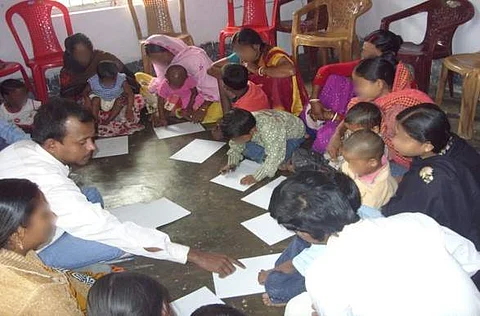

It was 2002 and Moyazzam Hossain was set to join his uncle in Kuwait to explore better job opportunities. He reached Mumbai, prepped with his visa and passport, to get his ticket. "They did a customary blood work before confirmation," Hossain recollects. "They came back and told me I can't go. They handed me a piece of paper with a big red stamp that read 'HIV positive'.
Moyazzam heard the word for the first time that day.
He had realised by this time that if he showed his report no doctor will probably tell him what this 'HIV' is. So, when he visited the next doctor he did not bring out the report rather he asked him about HIV. "This guy told me HIV is an irreversible disease and once someone has it there is no treatment and they will die for sure," says Moyazzam. He informed his brother back home in Dakshin Dinajpur, West Bengal, about the recent developments.
One day as he was roaming the streets of Mumbai in search of a better consult, a poster caught his eye — total herbal cure for HIV and AIDS. "I went there immediately. An old 'baba' sat thronged by people. After I told him I had HIV he didn't react like the others. He said that I will be cured with so much conviction that I had no I reason to not trust him," he says. "I was given a bottle of Ayurvedic medicine and asked me to continue it for the next six months and was also asked to follow a particular diet which should include bhindi (lady's finger) and I should not even touch non-vegetarian food." Moyazzam started living in Mumbai.
"But I was not satisfied. I went back home. It was 2003," says Moyazzam. "Back home everyone was depressed that this had happened to me but no one really spoke about it. I sort of separated myself from the rest. I also had separate utensils."
In 2006, he saw some hope when he started attending counselling sessions by an NGO and a ground-level network. He met an old friend who was also positive. "We made new acquaintances as well. The program officers told us what to do what not to and also organised regular check-ups," recounts Moyazzam. "They told me I did not need the medication then and only if my CD4 count drops below 200 they will start me on Antiretroviral Therapy (ART)."
Moyazzam and six others formed a network in their district to build a common platform for people to come and meet each other and discuss issues that they are facing every day and also think of solutions together. The number of members has now increased to 750. "The meetings gave us the confidence that this is just a disease and we cannot let it decide how we lead our lives. We started getting in touch with people who we knew were positive," adds Moyazzam. But in the meantime, his CD4 had dropped to 130. "They started the medicines. The side effects were horrifying — I was vomiting all the time, couldn't eat anything and this continued for over a year. But I never gave up working for the people. We would visit them no matter how far they lived."
The health department of the state proposed a project as part of the HIV eradication programme in 2008 and they took it up. "We did not have the skills required but we had the passion to work for those who have the same disease but are not getting p[roper care or the information required," adds Moyazzam. "We came in touch with SAATHI, an NGO which works with positive individuals, for a coalition based advocacy programme across the state. They gave us leadership and organisational development training."
Whether as a community health coordinator or for his own network, Moyazzam always focused on one thing, whether people are following the strict regime they are supposed to. "This has become a major part of the system now but back then no one paid much attention to such detail," he says. "We want to reach people even in the interiors. But that won't be possible if the government does not give us aid or funds of any kind. We have also arranged for bus passes for positive individuals which do not reveal they are HIV positive rather is just a free pass. Initiatives like these can also help."
But the most necessary element is the network of positive people working for others who are infected by the virus. Moyazzam feels if the government strengthens these networks then HIV can be eradicated or at the least restricted by 2030.
